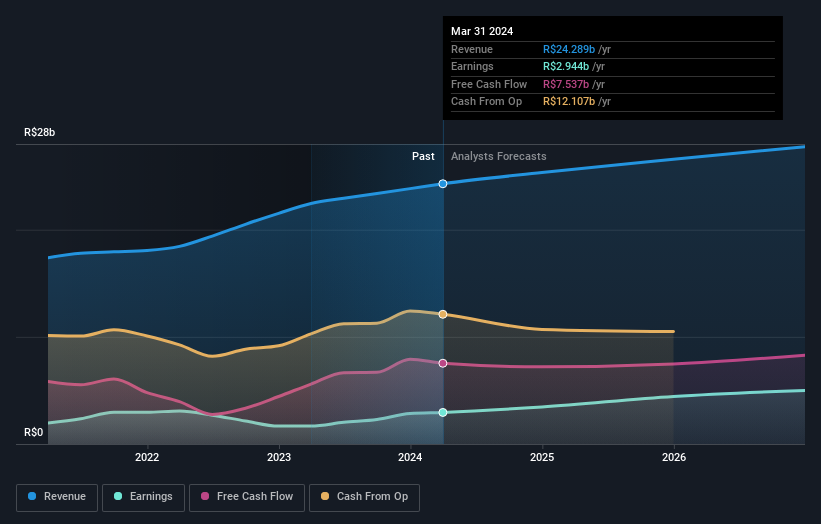- Brazil
- /
- Wireless Telecom
- /
- BOVESPA:TIMS3
TIM S.A. Earnings Missed Analyst Estimates: Here's What Analysts Are Forecasting Now

Shareholders might have noticed that TIM S.A. (BVMF:TIMS3) filed its first-quarter result this time last week. The early response was not positive, with shares down 5.2% to R$17.19 in the past week. It looks like the results were a bit of a negative overall. While revenues of R$6.1b were in line with analyst predictions, statutory earnings were less than expected, missing estimates by 6.7% to hit R$0.21 per share. Following the result, the analysts have updated their earnings model, and it would be good to know whether they think there's been a strong change in the company's prospects, or if it's business as usual. So we collected the latest post-earnings statutory consensus estimates to see what could be in store for next year.
See our latest analysis for TIM

Following the latest results, TIM's twelve analysts are now forecasting revenues of R$25.3b in 2024. This would be an okay 4.3% improvement in revenue compared to the last 12 months. Yet prior to the latest earnings, the analysts had been anticipated revenues of R$25.4b and earnings per share (EPS) of R$1.42 in 2024. Overall, while the analysts have reconfirmed their revenue estimates, the consensus now no longer provides an EPS estimate. This implies that the market believes revenue is more important after these latest results.
There's been no real change to the consensus price target of R$21.15, with TIM seemingly executing in line with expectations. There's another way to think about price targets though, and that's to look at the range of price targets put forward by analysts, because a wide range of estimates could suggest a diverse view on possible outcomes for the business. Currently, the most bullish analyst values TIM at R$23.00 per share, while the most bearish prices it at R$17.50. The narrow spread of estimates could suggest that the business' future is relatively easy to value, or thatthe analysts have a strong view on its prospects.
Another way we can view these estimates is in the context of the bigger picture, such as how the forecasts stack up against past performance, and whether forecasts are more or less bullish relative to other companies in the industry. It's pretty clear that there is an expectation that TIM's revenue growth will slow down substantially, with revenues to the end of 2024 expected to display 5.8% growth on an annualised basis. This is compared to a historical growth rate of 7.9% over the past five years. Juxtapose this against the other companies in the industry with analyst coverage, which are forecast to grow their revenues (in aggregate) 4.5% per year. So it's pretty clear that, while TIM's revenue growth is expected to slow, it's still expected to grow faster than the industry itself.
The Bottom Line
The clear take away from these updates is that the analysts made no change to their revenue estimates for next year, with the business apparently performing in line with their models. Happily, there were no major changes to revenue forecasts, with the business still expected to grow faster than the wider industry. The consensus price target held steady at R$21.15, with the latest estimates not enough to have an impact on their price targets.
We have estimates for TIM from its twelve analysts out to 2026, and you can see them free on our platform here.
Before you take the next step you should know about the 1 warning sign for TIM that we have uncovered.
Valuation is complex, but we're here to simplify it.
Discover if TIM might be undervalued or overvalued with our detailed analysis, featuring fair value estimates, potential risks, dividends, insider trades, and its financial condition.
Access Free AnalysisHave feedback on this article? Concerned about the content? Get in touch with us directly. Alternatively, email editorial-team (at) simplywallst.com.
This article by Simply Wall St is general in nature. We provide commentary based on historical data and analyst forecasts only using an unbiased methodology and our articles are not intended to be financial advice. It does not constitute a recommendation to buy or sell any stock, and does not take account of your objectives, or your financial situation. We aim to bring you long-term focused analysis driven by fundamental data. Note that our analysis may not factor in the latest price-sensitive company announcements or qualitative material. Simply Wall St has no position in any stocks mentioned.
About BOVESPA:TIMS3
TIM
A telecommunications company, provides mobile, fixed, long-distance, data transmission, and broadband services in Brazil.
Solid track record, good value and pays a dividend.
Similar Companies
Market Insights
Community Narratives


